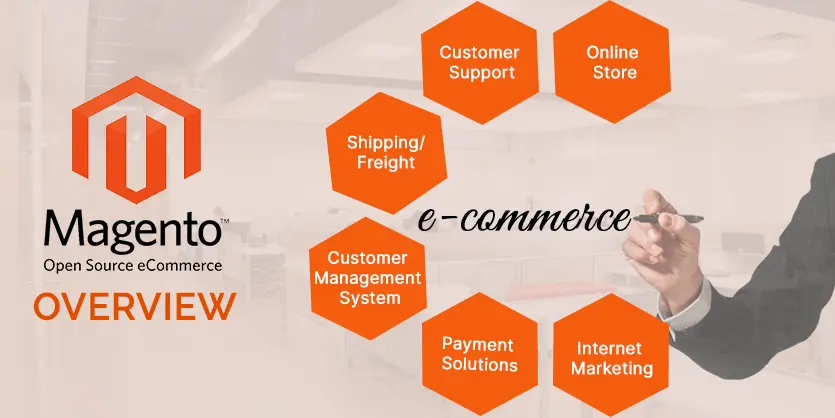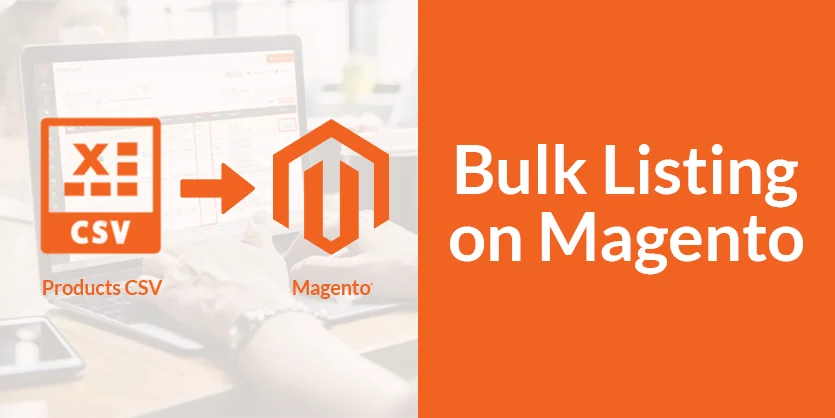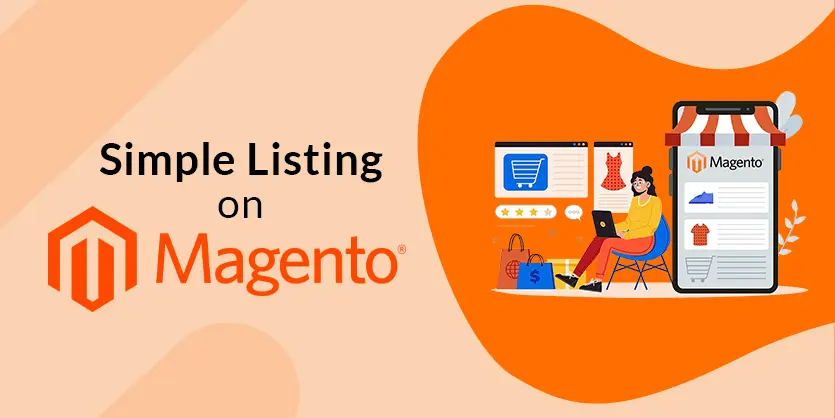Magento is one of America’s most popular eCommerce platforms. Magento is used by about 250k websites worldwide, and the number is continually growing. Its open-source technology allows users to customize the appearance, functionality, and content of their online store without compromising the shopping experience. Magento also provides a multitude of marketing, SEO, and catalog-management tools and functions to its users. In this article, we will go through the Magento platform in detail. After reading this article, you can decide whether you should consider Magento as an eCommerce platform for your business or not.
So keep reading,
What is Magento?
Magento is a global leader in digital media and marketing solutions Adobe-owned eCommerce website platform. It provides both a free Magento Open Source and a feature-rich Magento Commerce, allowing your business to grow and adapt. It also provides its customers with a wide range of plug-ins and themes to meet their needs and how they want their website to look.
What is Magento 2?
Magento 2 is the latest and improved version of the Magento platform. Magento’s developer took the platform down and rebuilt it after receiving concerns and comments against Magento. The system is updated on a regular basis, with Magento 2 being one of the most significant improvements to date. We highlighted a few significant features of Magento 2 that users will appreciate:
- Flexible architecture for websites
- Engaging customers experiences
- Efficient business experience
- 50% faster loading speeds
- Easier maintenance and upgrades
If you’re looking for a faster, safer, scalable website, Magento 2 is the way to go.
Why Should You Choose Magento 2 For Your E-Commerce Business?
Whether you are serving a few consumers or a million, the Magento 2 platform can handle any size of business. As a company grows, it may be necessary to switch platforms. However, Magento 2 makes it simple to stay in one place and grow. The following criteria will assist you in deciding why should you consider Magento 2 for your eCommerce business.
- Feature-rich & Powerful Platform
- SEO-Friendly
- Faster Loading
- Flexible Content Management
- Highly Customized
- Advanced Reporting
- Offers free services
- A supportive community that will help users navigate issues
If you’re still using Magento, you’re at risk for fines secondary to non-compliance and security issues. We recommend upgrading as soon as possible.
Is Magento 2 Really Better than Magento?
Magento 2 is supposedly the latest and more advanced version of Magento. It is more efficient, faster, and safer than Magento. Let’s take a look at how Magento and Magento 2 differ in a number of areas, is Magento 2 really better than the previous version (Magento)?
- Architecture: In Magento 2, more technologies are included to improve website optimization and customization. In fact, the developers entirely replaced the previous technological stack with a new one. As a result, switching to the application entails more than just data migration. On Magento 2, some notable technology such as Composer, NGINX, Redis, Symfony, and Varnish can be found however, they are not available on Magento.
- Website Performance: One of the areas where Magento struggled was with website performance. So, developers take into account and give priority to website performance on Magento 2. They wanted to put an end to these customers’ concerns and provide users with exactly what they desired. Magento 2 offers more customizability and flexibility in terms of website design and content to its users. It is optimized for faster loading times, lowers server response times, and has access to more extensions to improve website performance. This means you have more influence over how your website is presented. By optimizing your website’s content, you can make it run more quickly.
- Mobile Optimization: Every website and business needs to be mobile optimized. Magento 2 is far more mobile-friendly than the previous version of Magento. In fact, users can find a more responsive theme and a straightforward checkout experience. Progressive Web Apps are also supported by Magento 2, so users can utilize this to construct a mobile app that will improve their customer’s experiences.
- Security: Magento 2 gives you the freedom to make your website as safe as you want it to be. Patches and updates get out on a regular basis. With these, you can also use Extensions to improve security. On the other hand, Magento is no longer supported on this platform because security patches and updates are no longer available. So it’s important to realize that, PCI compliance is your responsibility because this isn’t something that comes standard with the platform. But it’s simple to achieve if you don’t go overboard with your website customization.
- Extensions: Magento had several extension conflicts that prevented third-party extensions from working on the platform or causing usability issues, whereas Magento 2 allows extensions to overlap. This allows users to install and utilize as many extensions as they wish. The extension has the potential to add value to your website, improve the customer’s experience, and increase sales. Extensions are useful, but you shouldn’t have too many of them. This could result in problems with loading and usability.
Who Should Use Magento 2?
Magento2 should be considered if you own or assist operate an eCommerce firm. The platform’s founders made it simple to use for regular people. This implies that you don’t need any programming or technical skills.
However, the system is dependable. The system becomes somewhat more difficult as your business grows because it can manage millions of consumers. In most cases, firms will need to seek outside assistance. Although, this will only be the case after the company begins to integrate multiple systems into its website.
Magento2 Pricing – How Much Does Magento2 Cost?
It’s critical to do some research on the pricing of Magento 2 before your start building your website. Because Magento2 has a complicated pricing system. The pricing highly depends on the edition and hosting you select. Magento2 is available in two different versions:
- Magento Open Source (Community Edition)
- Magento Commerce (Magento Enterprise Edition/Adobe Commerce)
Magento Open Source (Community Edition): Magento open source is absolutely free. To get your Magento store up and running, simply download and install it. You have practically endless modification options to tailor the store to your specific needs. However, fees such as domain, hostings, designs, and development might cost as much as $6000 per month to set up the store and launch the business (estimate).
Magento Commerce (Magento Enterprise Edition): Magento commerce price is right out of the box because it costs $22000 (estimate). Although some expenditures, such as hosting and other services are covered in the Magento commerce cloud subscription, it still requires other operating fees, bringing the total cost to between $30,000 and $50,000.
Which Version is best for your Business?
Magento open source is the free version that is available for free download. It’s designed for smaller eCommerce businesses that don’t need as much assistance as larger businesses. But, larger companies can still benefit from the open-source platform. If you operate a low-maintenance business, the free option may be a better alternative.
On the other hand, Magento commerce is a higher-level platform for B2B eCommerce. This edition has some outstanding customer segmentation tools that will help you customize your shopping experiences and, increase your conversion rate. It also uses Elasticsearch which allows customers to find and purchase everything they want quickly. This Magento version is specially designed for larger organizations. You need some hefty income to use this edition because the price tag starts from $22000 per year (estimate).
Is Magento 2 have Customer Support?
As Magento is no longer supported on the platform, so you can not get any updates from the developers. This means you are left to figure out the platform on your own. But with Magento 2, customer support service is depending on the version you are working with.
As we mentioned earlier, Magento 2 includes Magento open-source and Magento Commerce where open source is free. So open source does not come with customer support. This means customer support is available for the Magento commerce version only.
Magento Payment Gateways:
The best payment gateway will be determined by your individual business demands, whether you require global scalability, simple, no-frills payments, or anything else.
Basically, Magento comes with two payment gateway options by default: credit cards and PayPal. But other payment gateways such as Braintree, Stripe, Authorize.net, Amazon Pay, 2Checkout, and others are also available.
Drawbacks of Magento 2:
Every bean has it black. As a result, even after updating to the previous version, the Magento 2 platform has several drawbacks. Let’s take a look at some of Magento 2’s limitations that can make you reconsider using it as your eCommerce platform.
- Complexity: The Magento system is quite huge and complex. To create an online store, you will need a staff of developers and testers who are extremely professional and skilled.
- Development Cost: Magento site development often required a significant time and knowledge investment, which supports its expensive price.
- Time: Magento store customization takes longer than customization on other eCommerce platforms.
- Cost: Magento Community Edition is available for free. However, if you want extra features, such as the Commerce version, keep in mind that it comes with an annual subscription.
- Paid customer support
Wrapping Things Up,
Magento 2 should be a top priority for companies and individuals looking to build a long-term professional eCommerce site. This software platform will assist small, medium, and large-scale eCommerce enterprises with the setup and management of their online storefronts. It not only provides adaptable and scalable eCommerce solutions but also allows for customization. With Magento 2, eCommerce retailers may choose from a variety of hosted platforms rather than being tied to a single provider. Third-party add-ons and modules can be simply integrated with your Magento 2 store. Although Magento commerce is a bit pricey, the open-source version is totally free. In addition, not all versions come with customer support.
We tried to recap all the important elements of Magento that might help you to make the decision before using the Magento platform. We hope, you find this article helpful and if you have any further assistance, feel free to contact us through the comment box. Our Magento experts are always there for you to answer your question. Please subscribe to our blog and share this to know others.



